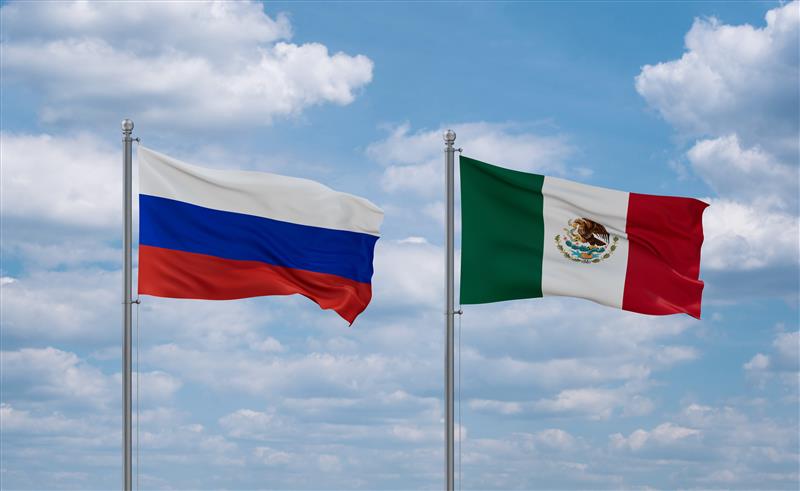Ten months after Russia’s 2022 full-scale invasion of Ukraine, the Club de Periodistas de México (The Club of Journalists of Mexico) bestowed awards upon three journalists from RT, a Russian state-owned media outlet, for their international coverage of the Kremlin’s “special operation in Ukraine”. In an acceptance speech on the winners’ behalf, Viktor Koronelli, the then-Russian ambassador to Mexico, stressed the importance of objective reporting and claimed the recognition confirmed Mexico’s support for Russia “in its fight against Ukrainian terrorism”.
The awards from a club that, according to its website, has “driven journalistic excellence and fostered collaboration” since 1952 are a striking example of Russia’s growing influence on Mexico’s and, more broadly, Latin America’s information ecosystem. Despite platform restrictions, RT and Sputnik, another Russian state-owned outlet, remain dominant mouthpieces in the region, with Russian state media’s Spanish-language accounts consistently outperforming their counterparts in English and other languages, and other outlets aimed at Latin American audiences. And this holds true regardless of platform. Before being removed from Meta’s platforms last year, RT en Español, for example, had more than 18 million followers on Facebook, surpassing Spanish-language offerings from international competitors such as CNN en Español and BBC Mundo. Moreover, RT en Español’s cable service broadcasts in nearly all Latin American countries, reaching an audience of more than 500 million people, 40 million of whom are in Mexico alone.
Russian state media has found success in Latin America through traditional means, but pro-Kremlin operatives are increasingly resorting to covert tactics to circumvent bans on state outlets and reach new audiences. These tactics include “information laundering”, the process of reposting content from an original source on a third-party website to obfuscate the provenance of the information. Venezuela’s state outlet TeleSUR, for example, serves as a “media vassal”, redistributing content from Russian and Chinese state media to reinforce narratives supporting autocracy and denigrating the West.
Given Club de Periodistas’ record of celebrating Russian state-media personnel and other propagandists, the Alliance for Securing Democracy (ASD) at GMF, as part of a larger investigation led by Factchequeado, a nonpartisan and nonprofit organization fighting disinformation, analyzed content produced by the Club’s online news aggregator and opinion site, Voces del Periodista Diario (Journalist’s Voices Daily). ASD’s findings indicate that, like the Club itself, Voces del Periodista Diario acts as a conduit for pro-Kremlin and anti-Western propaganda, laundering almost two-thirds of its content since April 2025 from RT en Español, Sputnik Mundo, and the Cuban state-run Prensa Latina. This finding, coupled with Factchequeado’s reporting, raises questions about the club’s role in furthering Russian strategic objectives in Latin America.
Data and Methods
ASD experts collected content published on Voces del Periodista on or before September 29, 2025, via WordPress endpoints. Fully 4,539 unique articles were found, for which ASD captured several fields, including the URL, author, title, content, and time of publication. Because Voces often cites at the bottom of each article its original publisher, ASD could, in some cases, also extract sourcing. All unattributed articles were grouped in a separate category.
From the extracted data, experts used Named-Entity Recognition, a natural-language processing technique that identifies predefined categories of objects in a body of text, to count mentions of people and places by source.
Sourcing and Temporal Analysis
More than half (54%) of all articles on Voces’ website are attributed to Russian or Cuban state-run media outlets—RT en Español (23.7%), Sputnik Mundo (16.4%), and Prensa Latina (14%). More than 40% originated from Russian sources alone. But those percentages are skewed lower by the fact that Voces did not start sourcing content, at least transparently, from Russian or Cuban outlets until April 1, 2025, according to ASD’s temporal analysis. Prior to that date, the website published an average of 35.6 articles per week, none of which was attributed to state-backed outlets. Seemingly overnight, however, the website nearly quadrupled its output to an average 136.9 articles per week, the bulk of which were sourced from Russian and Cuban state-run outlets. Between April and September 2025, nearly three-fourths of all articles published on Voces del Periodista were sourced from RT en Español, Sputnik Mundo, or Prensa Latina, with more than 50% of articles sourced from the two Russian state media outlets. Additionally, more than half of articles published after April 1 were published within five minutes of one another, signaling the likely use of automation to source and publish the content.
The effect of this is clear. Whatever Voces del Periodista’s purpose was prior to April, it now serves as less of an aggregator or producer of regional news than an amplifier of state-backed propaganda. In the frame of media vassalage, the website appears as a client node: It routinely imports, packages, and circulates narratives from Russian and Cuban state media, lending them local presence and legitimacy.
Voces del Periodista’s Content
To compare the relative frequency of topics in the captured articles since April 1, ASD extracted the most-mentioned key words from Prensa Latina, RT en Español, Sputnik Mundo, and unattributed articles. Though some words were difficult to peg to a specific topic— “ministro” (minister), for example—others, such as place names, more easily lent themselves to comparative analysis. ASD’s examination of the data determined that articles republished by Voces de Periodista from Russian-state media outlets largely focused on US politics and the Ukraine war. RT articles had the most mentions of “Rusia” (Russia)—even accounting for likely over-indexing due to the outlet’s name. They also had the most mentions of “Moscu” (Moscow), and “Kiev” (Kyiv), while articles sourced from Sputnik News had the most mentions of “Ucraina” (Ukraine). These articles contained distinctly pro-Russian takes likely absent from those in Latin American regional outlets. Allegations included a meeting between the United States and the United Kingdom to discuss replacing Ukrainian President Volodymyr Zelenskyy and collaboration between Ukraine and terrorist organizations in Africa.
Mentions of US politics were also significantly greater in Russian state-media outlets than in Prensa Latina or in articles from unattributed outlets. Terms such as “Trump”, “Washington”, and “Estadounidense” (American) occurred as much as four times as often. Geopolitical flashpoints such as “Israel”, “Irán”, and “China” also received far more mentions in articles republished from the two Russian state-media outlets compared to other articles republished by Voces.
Unattributed content, in contrast, focused on Mexican domestic politics and social policies. These articles (which seemingly include some original reporting mixed with articles sourced from Mexican and other regional outlets) mentioned “México”, “Sheinbaum”, and “presidenta” (presumably, due to the gendered spelling of the word, in reference to Mexican President Claudia Sheinbaum) far more often than Russian or Cuban outlets did.
Voces del Periodista consequently appears as a genuine, domestic journalistic endeavor while simultaneously advancing Russian and Cuban perspectives on US policies, the war in Ukraine, geopolitics, and international affairs.
Conclusion
ASD’s analysis suggests that Voces del Periodista now acts more like a front for Russian and Cuban propaganda than a “platform that promotes freedom of expression and journalistic rigor”, as its website claims. The outlet functions as a client node in a media-vassalage chain, routinely importing, repackaging, and rebroadcasting state-backed narratives, granting them local presence and legitimacy. Patron power is concentrated, and dependence is high. A small cluster of state-aligned suppliers shapes most of the site’s international content, clearly benefitting Russia. There may be legitimate reasons for a Mexican journalism club to provide a Russian or Cuban perspective on international affairs, but the lack of diversification of sources and the questionable transparency around the provenance of those sources is at odds with the club’s stated mission.
The views expressed in GMF publications and commentary are the views of the author alone.






